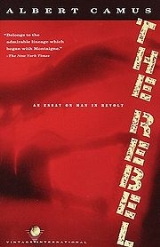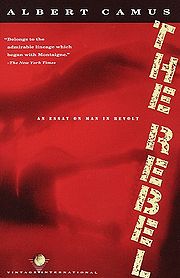
The Rebel
Encyclopedia

Essay
An essay is a piece of writing which is often written from an author's personal point of view. Essays can consist of a number of elements, including: literary criticism, political manifestos, learned arguments, observations of daily life, recollections, and reflections of the author. The definition...
by Albert Camus
Albert Camus
Albert Camus was a French author, journalist, and key philosopher of the 20th century. In 1949, Camus founded the Group for International Liaisons within the Revolutionary Union Movement, which was opposed to some tendencies of the Surrealist movement of André Breton.Camus was awarded the 1957...
, which treats both the metaphysical
Metaphysics
Metaphysics is a branch of philosophy concerned with explaining the fundamental nature of being and the world, although the term is not easily defined. Traditionally, metaphysics attempts to answer two basic questions in the broadest possible terms:...
and the historical development of rebellion
Rebellion
Rebellion, uprising or insurrection, is a refusal of obedience or order. It may, therefore, be seen as encompassing a range of behaviors aimed at destroying or replacing an established authority such as a government or a head of state...
and revolution
Revolution
A revolution is a fundamental change in power or organizational structures that takes place in a relatively short period of time.Aristotle described two types of political revolution:...
in societies
Society
A society, or a human society, is a group of people related to each other through persistent relations, or a large social grouping sharing the same geographical or virtual territory, subject to the same political authority and dominant cultural expectations...
, especially Western Europe
Western Europe
Western Europe is a loose term for the collection of countries in the western most region of the European continents, though this definition is context-dependent and carries cultural and political connotations. One definition describes Western Europe as a geographic entity—the region lying in the...
. Camus relates writers and artists as diverse as Epicurus
Epicurus
Epicurus was an ancient Greek philosopher and the founder of the school of philosophy called Epicureanism.Only a few fragments and letters remain of Epicurus's 300 written works...
and Lucretius
Lucretius
Titus Lucretius Carus was a Roman poet and philosopher. His only known work is an epic philosophical poem laying out the beliefs of Epicureanism, De rerum natura, translated into English as On the Nature of Things or "On the Nature of the Universe".Virtually no details have come down concerning...
, the Marquis de Sade
Marquis de Sade
Donatien Alphonse François, Marquis de Sade was a French aristocrat, revolutionary politician, philosopher, and writer famous for his libertine sexuality and lifestyle...
, Georg Wilhelm Friedrich Hegel
Georg Wilhelm Friedrich Hegel
Georg Wilhelm Friedrich Hegel was a German philosopher, one of the creators of German Idealism. His historicist and idealist account of reality as a whole revolutionized European philosophy and was an important precursor to Continental philosophy and Marxism.Hegel developed a comprehensive...
, Fyodor Dostoyevsky, Friedrich Nietzsche
Friedrich Nietzsche
Friedrich Wilhelm Nietzsche was a 19th-century German philosopher, poet, composer and classical philologist...
, André Breton
André Breton
André Breton was a French writer and poet. He is known best as the founder of Surrealism. His writings include the first Surrealist Manifesto of 1924, in which he defined surrealism as "pure psychic automatism"....
and others in an integrated, historical portrait of man in revolt. Examining both rebellion and revolt, which may be seen as the same phenomenon in personal and social frames, Camus examines several 'countercultural' figures and movements from the history of western thought and art, noting the importance of each in the overall development of revolutionary thought and philosophy.
Themes
One of Camus' primary arguments in The Rebel concerns the motivation for rebellion and revolution. While the two acts - which can be interpreted from Camus' writing as states of being - are radically different in most respects, they both stem from a basic human rejection of normative justice. If human beings become disenchanted with contemporary applications of justice, Camus suggests that they rebel. This rebellion, then, is the product of a basic contradiction between the human mind's unceasing quest for clarification and the apparently meaningless nature of the world. Described by Camus as "absurdAbsurdism
In philosophy, "The Absurd" refers to the conflict between the human tendency to seek value and meaning in life and the human inability to find any...
", this latter perception must be examined with what Camus terms "lucidity." Camus concludes that the absurd sensibility contradicts itself because when it claims to believe in nothing, it believes in its own protest and the value of the protester's life. Therefore, this sensibility is logically a "point of departure" that irresistibly "exceeds itself." In the inborn impulse to rebel, on the other hand, we can deduce values that enable us to determine that murder and oppression are illegitimate and conclude with "hope for a new creation."
Another prominent theme in The Rebel, which is tied to the notion of incipient rebellion, is the inevitable failure of attempts at human perfection. Through an examination of various titular revolutions, and in particular the French Revolution
French Revolution
The French Revolution , sometimes distinguished as the 'Great French Revolution' , was a period of radical social and political upheaval in France and Europe. The absolute monarchy that had ruled France for centuries collapsed in three years...
, Camus argues that most revolution has involved a fundamental denial of both history and transcendental values. Such revolutionaries aimed to kill God. In the French Revolution, for instance, this was achieved through the execution of Louis XVI and subsequent eradication of the Divine Right of Kings. The subsequent rise of Utopian and materialist idealism sought "the end of history." Because this end is unattainable, according to Camus, terror ensued as the revolutionaries attempted to coerce results. This culminated in the "temporary" enslaving of people in the name of their future liberation. Notably, Camus' reliance on non-secular sentiment does not involve a defence of religion; indeed, the replacement of divinely-justified morality with pragmatism simply represents Camus' apotheosis of transcendental, moral values.
Faced with the manifest injustices of human existence on one hand, and the poor substitute of revolution on the other, Camus' rebel seeks to fight for justice without abandoning transcendental values, including the principle of the intrinsic value of human life. Consequently, some rebels attempt to justify their actions through a crude form of payment. As Camus argues, the Russian terrorists active in the early 20th century were prepared to offer their own lives as payment for the lives they took.
A third is that of crime
Crime
Crime is the breach of rules or laws for which some governing authority can ultimately prescribe a conviction...
, as Camus discusses how rebels who get carried away lose touch with the original basis of their rebellion and offer various defenses of crime through various historical epochs.
At the end of this book Camus exposes the possible moral superiority of the ethics and political plan of trade unionism.

